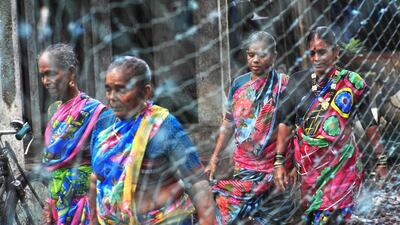MUMBAI // Against the backdrop of concrete towers and the morning smog and chaos of Mumbai, tired fisherman arrive on their small, brightly coloured boats. They wade through the murky waters to reach the land, sporting their catch after several hours out at sea.
Such scenes can be found in fishing communities dotted along the city’s coastline, which are home to the Kolis, who are widely considered to be the original inhabitants of Mumbai.
But overfishing by big trawlers, pollution, and the fact that the better-educated younger generations want to move into white-collar jobs, all pose a threat to the traditional fishing industry in the city, the Koli fishermen say.
“The way things are going, fishing in these communities is going to disappear,” says Yashwant Nijai, the secretary of the Mahim Nakhava Machimar Cooperative Society.
He says the traditional fishing industry is set to die out within five years “from Worli to Versova”, two areas of Mumbai that encompass a major stretch of the city’s coastline. He blames pollution and trawlers that are “taking everything from the sea” for the plight of the Koli fishermen.
“There’s too much exploitation of the seas,” Mr Nijai says. Chemical waste in the water is killing off the fish, he adds, while an abundance of abandoned plastic bags is also spoiling the nets.
“As development has progressed, pollution is coming into the water and the catch is going down. The difference between business now compared to how it was when I became a fisherman in 1976 is the difference between Earth and sky. The boats used to travel out for about half an hour from the shore to fish but now it takes three to four hours to reach a destination to fish.”
Reflecting the problems in the industry, in 2005 there were 33 fishing boat owners signed up to his society, but now there are only 14 boats, as many of the fisherman sold their vessels.
Datta Thalker, 55, a fisherman in Khar Danda in Mumbai, has been fishing for as long as he can remember, with his family having been in the business for several generations.
“The catch has definitely gone down,” he says. “It’s halving every year. We can see chemicals in the water and there are so many plastic bags.”
He used to be able to catch black pomfret, but he has not even seen the fish in the waters for 10 years. They used to fish near the shore but now they have to travel out about 70 kilometres into the Arabian Sea to fish, he says.
Costs are also increasing, with diesel prices having risen. The fishermen in Khar Danda say that they have also had to raise prices. They now sell Jawala, a type of shrimp, to the wholesale market for 30 rupees (Dh1.75) a kilogram compared with 20 rupees last year. It is tough to make money, they say.
“I have to manage,” Mr Thalker says. “Once in a while I used to splurge but I have stopped that.”
He says he is uneducated and while he has considered finding another way to earn a living, fishing is all he knows.
His children have no interest in following in his footsteps.
His 18-year-old daughter is pursuing a commerce degree and his 19-year-old son works for a security company.
“There’s a scarcity of catch, a scarcity of labour, and the children are just not interested in fishing,” Mr Thalker says.
Another fisherman in Khar Danda, Jagdish Chavry, 43, is encouraging his children – a son who is 16 and a daughter, 11 – to aim to go into jobs in computing and technology. “Fishing is a hard, physical industry,” he says. “The next generation is not going to be in this business. They want a sophisticated life. This is a hard life.”
The trawlers are an increasing threat to their livelihoods and it is difficult for the traditional fishermen to compete with them as they use technology to locate the schools of fish and sweep the ocean.
“The government is promoting trawler fishing more because they get export revenues,” says Govind Nanhu, 66, who sold his boat 15 years ago. Traditional fishing “is only for the local market”.
Some Kolis have bought trawlers to try to exploit modern fishing methods. But this a costly venture with each trip out to sea costing about 150,000 rupees and taking up to two weeks. Sometimes the trawlers do not manage to pick up enough fish to cover their costs, according to the fishermen.
Mr Nijai says trawlers cost about 2 million rupees and some Kolis have got into debt buying them and are struggling to service their debts and cover their expenses.
“It’s for the rich fisherman, not the poor fishermen,” says Mr Nijai. The mass fishing methods are ruining the eco-system and depleting future resources, he adds.
Another concern is the threat of developers who want to get their hands on prime sea-facing land, where many Kolis still live.
“We are the original inhabitants of Mumbai,” he says.
business@thenational.ae

